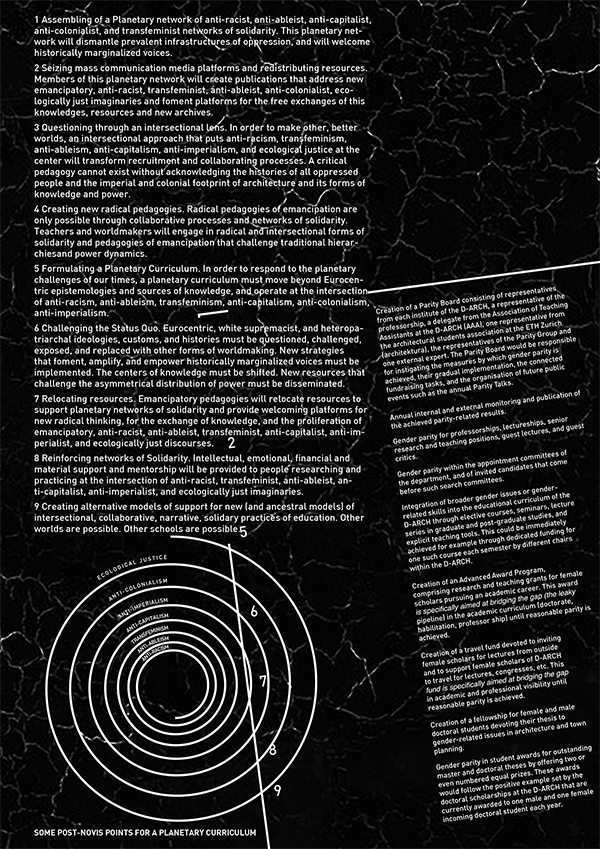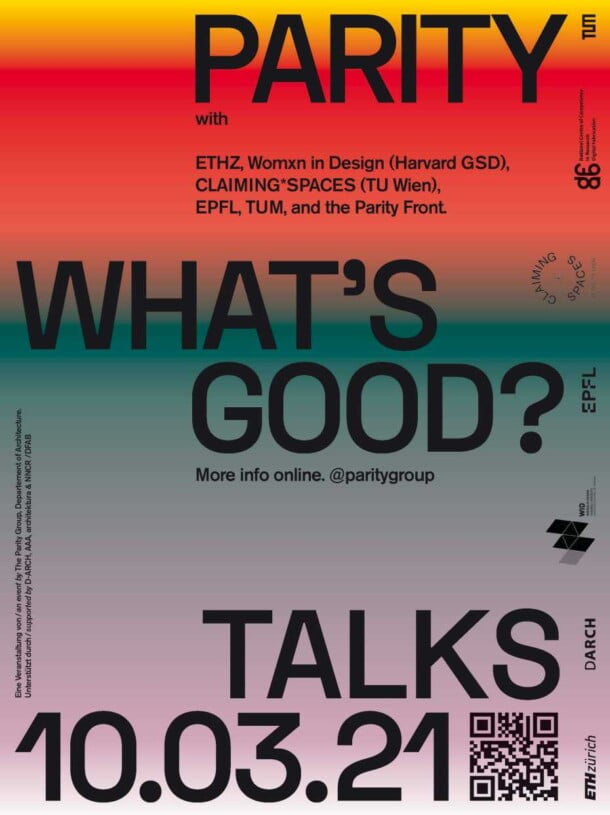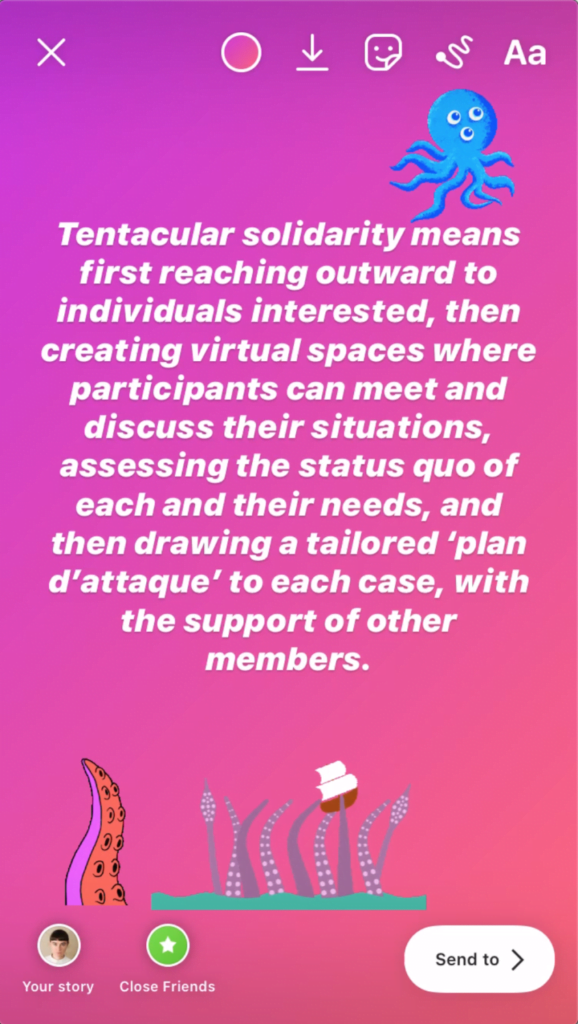Gender and inclusion are the focus for the Parity Group, an informal collective established in 2014 and based at ETH Zurich’s Department of Architecture. The connected Parity Front is an independent offshoot that aims to support the conversation around gender balance, representation, inclusion and harassment in schools beyond ETH.

Parity Group
(ETH Zurich, Switzerland)
The Parity Group is an informal and fluid aggregation of people who care about the topic of gender and inclusion, based at the Department of Architecture at the ETH Zurich. Established in December 2014, the grassroots organisation is centred around a core of about 20–30 people but counts anyone that shows up to a meeting as a member (even if it’s just once).
The Parity Group has a more formal relationship with the institution through an official department committee, the Parity and Diversity Commission (PDK), which was established as part of ongoing institutional activism. PDK has balanced representation of students, teaching staff and professors and the two staff representatives in the PDK are usually the drivers of the Parity Group’s meetings, agendas and other organisational matters.
The Parity Group’s audience is principally the ETHZ architecture department, and its main focus is on improving gender equality and equity within the department. However, the group also reaches out across the university and beyond to other design institutions and practices via the annual Parity Talks event and the independent offshoot organisation, Parity Front.
Motivations
The general absence of discussion on all matters gender and inclusion was the motivation for forming Parity Group, but an all-male panel at a crit was the spark. This led to a gathering of assistants at the school in December 2014, which became the starting point of the Parity Group. This first meeting led to an official submission to the school administration to create a platform for discussion: the Parity Talks, a yearly event since 2016.
Roadmap for change
During the first Parity Talks, we created a roadmap to strategically improve the gender balance within the department, ‘the 9 points for parity’. These are:
- Creating a Parity Board, responsible for instigating the measures by which gender parity is achieved, their gradual implementation, the connected fundraising tasks, and the organisation of future public events such as the annual Parity Talks.
- Annual internal and external monitoring and publication of the achieved parity-related results.
- Gender parity for professorships, lectureships, senior research and teaching positions, guest lectures, and guest critics.
- Gender parity within the appointment committees of the department, and of invited candidates that come before such search committees.
- Integration of broader gender issues or gender-related skills into the educational curriculum of the D-ARCH through elective courses, seminars, lecture series in graduate and post-graduate studies, and explicit teaching tools.
- Creation of an Advanced Award Program, comprising research and teaching grants for female scholars pursuing an academic career. This award is specifically aimed at bridging the gap (the leaky pipeline) in the academic curriculum (doctorate, habilitation, professorship) until reasonable parity is achieved.
- Creation of a travel fund devoted to inviting female scholars for lectures from outside and to support female scholars of D-ARCH to travel for lectures, congresses, etc. This fund is specifically aimed at bridging the gap in academic and professional visibility until reasonable parity is achieved.
- Creation of a fellowship for female and male doctoral students devoting their thesis to gender-related issues in architecture and town planning.
- Gender parity in student awards for outstanding master and doctoral theses by offering two or even numbered equal prizes. These awards would follow the positive example set by the doctoral scholarships at the D-ARCH 6 that are currently awarded to one male and one female incoming doctoral student each year.
Points 1, 2 and 4 have been achieved over the past five years, and point number 5 is being addressed with the funding application for the supplication of the core curriculum within the department. These points, written during the 2016 Talks, are being revisited and updated through a collaborative process with students and faculty, and we asked WAI Think Tank (guest speakers at Parity Talks 6, 2021) to annotate the 9 points. Their suggestions provide a global counterpoint to our initial institutional proposals, which we will use to help revise our school specific agenda.

Activities and action underway
The annual Parity Talks provide a discussion forum to highlight key issues. The agenda of the Talks remains the prerogative of the grassroots Parity Group and does not lie with the Department. This is important to guarantee the relevance of topics and to avoid too much institutionalisation and instrumentalisation. In 2021, the Parity Talks joined forces with four other institutions (TUM, TU Wien, Harvard GSD, and EPFL) to reflect on how the situation has evolved for planning disciplines.
The Parity Group hosted a day-long event on 10 March 2021 at the ETHZ, which was a collective questioning of ‘What’s Good?’ Together we discussed our current understanding of good practice, who decides what is good, and the problems of education based on ideas of excellence.
The push for curriculum change occurs through funding applications. We have an upcoming application to a scheme set up by the ETH, which is specifically aimed at supporting initiatives for advancing education. Once granted, this funding will go towards the development of an inclusive architectural curriculum.
The group also instigates broader debate on the culture of the institute. Together with the Engagement Arts collective, we’ve set in motion a process on how to create and sustain an inclusive, safe and productive work and study environment at the architecture department of the ETH, where staff and students flourish and thrive. By generating knowledge and insights about what is missing and what is needed to create genuine inclusivity and wellbeing, it aims to put into place methods and tools to collect, share and circulate that knowledge.
Challenges
Institutional inertia is always something we are struggling against. The idea that large institutions must be slow to change simply isn’t true; it just requires a willingness. Identifying the power structures behind the institution is important to understand where our energy should be directed. Making diversity, inclusion and belonging – subjects intrinsically relevant to design – appeal to the whole architecture department is also a continued challenge.
The impact of COVID-19
The COVID-19 situation has been quite impactful on our activities. Our 2020 Parity Talks were cancelled at short notice, one day before the event was due to take place. After re-organising that session and moving online, our next event took full advantage of the opportunities that online organising offers. We reached out across institutes and in 2021 we joined forces with four other schools of architecture. The necessity of a Zoom event has actually offered a great opportunity for collaboration.

Parity Front
(Zurich/Boston/Amsterdam)
The Parity Front was established in July 2020 as an independent offshoot of the Parity Group. The main aim is to support the conversation beyond ETH to other schools, the profession and other disciplines. The main issues addressed include gender balance, representation, inclusion and harassment.
The Parity Front has 2–4 regular members and a loose group of 15. The main members actively support other groups by consolidating connections between groups and institutions both in Switzerland and abroad, with the aim to create new global networks of solidarity and common strategies. This is a great resource for others looking to establish an organisation. For instance, the Parity Front was able to provide advice and knowledge to a parity group at EPFL in Lausanne. So, please reach out if you are in need of any support!
Plans for future action and activities include a larger network, creating a web page to support students/young practitioners facing discrimination, and hosting guerilla workshops for activists.
Contacts – Parity Group
Amy Perkins & Benjamin Groothuijse
Web: parity.arch.ethz.ch
Email: parity@arch.ethz.ch
Insta: @paritygroup
Contacts – Parity Front
Charlotte Malterre-Barthes & Benjamin Groothuijse
Email: parityfront@gmail.com
Insta: @parity_front




















